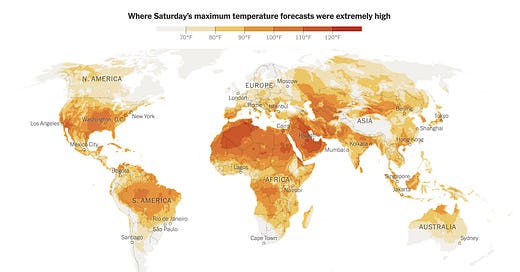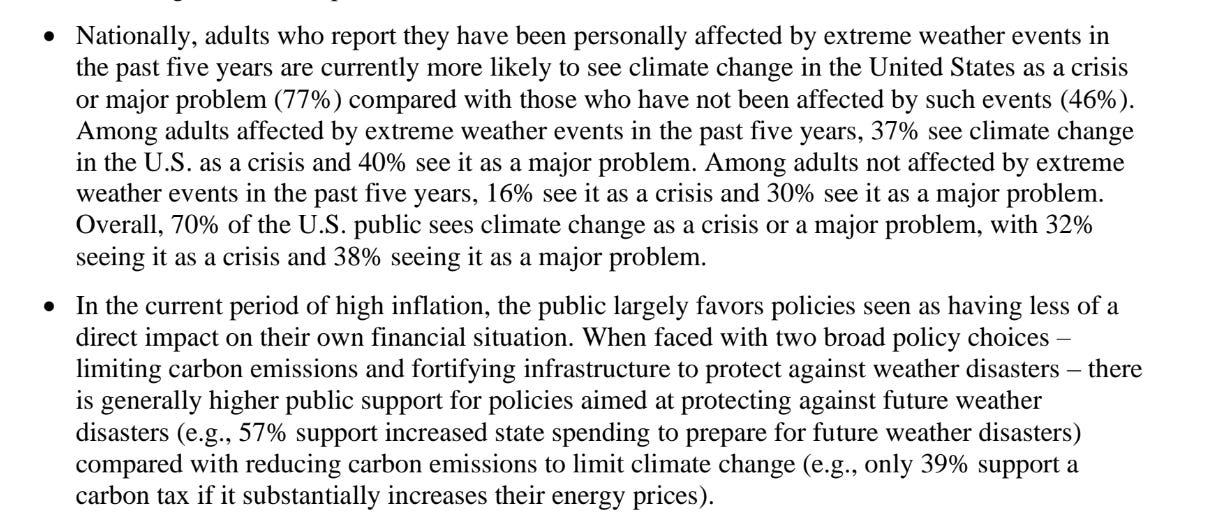Cranking up the heat on emergency climate change policy
Could this vicious heat wave spur political and social change?
Welcome to a Saturday night edition of Progress Report.
I don’t know whether going away for the weekend is considered a vacation, but semantics aside, I’m writing to you from the first non-work trip that my wife and I have taken since well before the baby was born last September. Shea is now 10-months-old and beginning what will hopefully be a lifetime of adventure. We’re starting small: yesterday, he visited the beach for the first time.
I think he may prefer the fountains in the little park across the street from our apartment building, and to be fair, those those fountains have been a lifesaver over the past few months. In an urban heat island built of concrete and glass, the mini-geysers offer cool relief from a barbaric semi-permanent heat wave that is blanketing much of the world.
We’re breaking this edition of the newsletter into two distinct halves, partially due to the travel and partially to make sure important stories don’t get buried. In this half, we’re talking about the impact and politics of this unprecedented scorching; the second, which will hit your inbox later in the day, will focus on the Supreme Court, important policy developments across several states, unconscionable media failures, and more.
With just a few days remaining, July is on pace to become the hottest month on record since scientists began tracking global temperatures in 1880. There have been more than 2,000 heat records broken over the past 30 days in the US alone, and entering this weekend, 184 million Americans were living under extreme weather advisories.
Society isn’t designed to function under these conditions, and as is always the case, it’s working people that bare the brunt o it.
President Biden asked the Department of Labor to issue the first-ever Hazard Alert for heat safety in the workplace, and promised that OSHA would step up enforcement of existing rules. Unfortunately, those existing rules are vague and weak, and while the federal government is working on specific new protections, it has yet to finish drafting them.
Only six states have laws on the books that guarantee workers access to water, shade, and rest, while red states’ new fixation on preemption laws have actually begun to ban local governments from adopting labor protections. In Texas, the Death Star preemption law (which we began covering well before the national media) rolled back the water break guaranteed to workers in Dallas and Austin, the latter of which has been experiencing record-breaking temperatures every single day for the past week. Earlier in the month, temperatures in El Paso hit 100° for 36 straight days before cooling off to a mere 99°.
Texas Rep. Greg Casar this week launched a thirst strike — basically a hunger strike that also forbids drinking — alongside workers from the state to protest the ban on heat protections. The Death Star law was signed by Gov. Greg Abbott the same month that at least 13 workers in the state died from overheating.
Rep. Joaquin Castro joined a rally held by Casar, Delores Huerta, and Texas workers outside the US Capitol and challenged Abbot to live under the conditions that he imposed upon millions by signing that bill.
“One day in the governor’s mansion, the air-conditioned governor’s mansion, without water,” Castro said. “Or better yet, one day with the folks who are out in the fields, the folks who are out on top of roofs, the folks who are at construction sites.”
I reported and produced a story on workers in Austin who were denied those water breaks while working on the Tesla gigafactory last summer. The details are brutal.
The heat is even worse in Arizona. In Phoenix, temperatures have exceeded 110° for more than 30 straight days. Hospitalizations are spiking, to the point that at one hospital, the number of patients has reached Covid-era heights. A Yuma-area farmworker collapsed and died in the field due to the heat on Thursday, while community gardens and concerts are being canceled in quick succession.
The metal band Disturbed had to postpone its concert because the heat was so intense that it fried all the instruments. That’s how bad it’s gotten.
Outdoor sports, too, are at risk of becoming a relic of old summer days that did not send the body into shock after short stretches of sun exposure. As high schools begin football practice across the south, some are taking special precautions, like changing the schedules and protocols, while others have started to cancel practices altogether.
Conservatives have and continue to attempt to dismiss this as a natural function of it being summer, but that idiotic argument loses its efficacy as the oppressive heat becomes far more than a simple seasonal inconvenience. For the most part, the consequences of climate change have been portrayed as melting ice caps and monstrous storms, extraordinary acts of God that are impossible to prevent while also limited to very specific regions. As this unprecedented heat lingers over the country, it’s beginning to feel like a miserable and oppressive new normal for everybody, more permanent than random.
This is where the politics may begin to change. Fossil fuel companies have been wildly successful at not only obscuring the threat and science of the damage that they’ve spent the past century causing, but also shifting the onus of mitigating the threat to individual action. Recycling, composting, saving water, installing some energy-saving appliances are all tedious and frequently costly activities that feel to many like impositions from judgmental elites.
However useful those activities are, they’ve also fostered a sense of resentment among many people, especially because they come with little obvious material benefit. This heatwave, I think, could prove to be a turning point in that regard, especially if focus shifts to new activities that can have an immediate impact without demanding personal sacrifice.
Less than a quarter of Republicans now see climate change as a serious threat, but according to a study released in 2022, among Americans who say they have experienced extreme weather over the past five years, there is very strong support for federal intervention. A vast majority of the American public in favor of federal intervention, in turn, are much more supportive of policies that don’t raise their taxes or the price they pay for energy.
This survey was done before the current heat bomb; my hunch is that these record temperatures boost the number of people who think climate change is a big problem, but does little to move people on wanting to pay more to prevent it. But let’s focus on the positive: experiencing extreme weather increases support for climate policy, and at this point, everyone is experiencing extreme weather.
Global warming isn’t easy to solve, obviously, but there are immediate ways to mitigate the heat that can also have a larger impact if done on a broad scale. Conservatives want cool, shady places to play with their kids, and blue collar workers, no matter their politics or feelings about the politicians who support the Green New Deal, very much prefer water breaks over heat stroke and hospitalization.
Activating those sentiments and organizing local efforts to demand new trees, more community pools, and better labor protections is a way to further climate policy and line up a new popular consensus and political demand for larger measures.
Will Republicans want to be held responsible for the collapse of high school football? Maybe they won’t care — and perhaps even pass a law outlawing the cancelation of games — but that won’t be tenable as things get even worse. Instead of focusing on the catastrophic existential threats posed by climate change, it’s these more tangible everyday issues that will ultimately drive change.
Stay cool, everybody.
Wait, Before You Leave!
Progress Report has raised over $7 million dollars for progressive candidates and causes, breaks national stories about corrupt politicians, and delivers incisive analysis, and goes deep into the grassroots.
None of the money we’ve raised for candidates and causes goes to producing this newsletter or all of the related projects we put out. In fact, it costs me money to do this. So, I need your help.
For just $5 a month, you can buy a premium subscription that includes:
Premium member-only newsletters with original reporting
Financing new projects and paying new reporters
Access to upcoming chats and live notes
You can also make a one-time donation to Progress Report’s GoFundMe campaign — doing so will earn you a shout-out in the next weekend edition of the newsletter!






